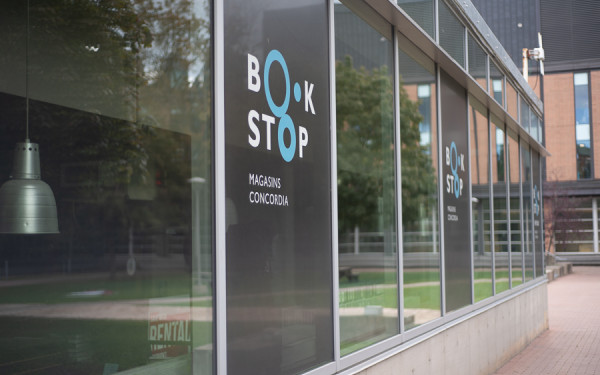Concordia bookstore has quietly been privatized
Follett Canada has taken over campus bookstore operations as of June 1
Concordia’s bookstore—known as the Book Stop—has been privatized. As of June 1, 2020, the store's operations have been taken over by Follett Canada. Prior to the sale, Concordia’s retail operations were run by Concordia itself.
The change comes as bookstores of all kinds face increasing pressure from online retailers like Amazon. But the move to privatize has raised questions about Concordia’s labour practices, about the implications of the agreement for students’ privacy, and about the availability of affordable course materials during the COVID-19 campus closure.
The sale of the Book Stop to Follett Canada was announced on May 26. Follett Canada is a subsidiary of the Follett Higher Education Group, a U.S.-based multinational campus retail provider. According to their corporate website, Follett has a presence in over 80,000 schools and operates 1,200 campus stores, in addition to a number of online stores.
3_900_600_90.jpg)
In their notice announcing the sale to Follett, Concordia touted a range of cost-saving benefits for students—including access to Follett’s textbook rental service, textbook price-matching service, and textbook buyback service. Given that these services were all already offered by the Concordia owned and operated Book Stop, it remains unclear what new benefit the change in ownership will bring to Concordia students.
One notable change is to the Book Stop’s privacy policy. Previously, the Concordia-owned bookstore’s privacy policy explicitly stated that it did not participate in ad networks or use other behaviour tracking technologies. The new policy allows Follett to work with third-party advertising and analytics providers, which can in turn collect information about students’ usage of the Book Stop. As an account is required to make online purchases, consenting to this privacy policy is mandatory for all Concordia students who purchase materials through the Book Stop.
An analysis of the new website found that the page is reporting information about users back to advertisers and third-party trackers. Overall, the new Book Stop website uses 13 different ad trackers, and installs 12 different third-party cookies on users’ devices. The Book Stop website also now runs Google ads on its home page.
Concordia initially announced its intention to privatize the Book Stop in a press release on Feb. 27, 2020. “[...] Book Stop has been struggling financially for some time now,” Concordia’s vice-president of services Roger Coté stated at the time.
The shift to a new business model was cited as necessary to ensure that students and faculty could continue to have access to course materials.
Concordia’s public financial statements dispute Coté’s claims, however. While retail store revenues did decline in the 2018-2019 fiscal year as compared to the year before, the store made over $300,000 in net profits in the year prior to the sale.
1_900_600_90.jpg)
Labour practices
Prior to the Book Stop’s privatization, the majority of the store’s full-time staff were unionized. According to several former Book Stop employees with knowledge of the transition, unionized staff were largely moved to other units within Concordia or given exit packages. Full-time, unionized staff members were informed of the sale several days before it was announced publicly.
Non-unionized staff, most of whom were Concordia students working at the store part-time on casual contracts, were not informed of the sale. The only official communication to part-time staff came on April 15—in the midst of COVID-19 and Concordia’s campus shutdown. At that time part-time staff were given two weeks notice that their contracts were being terminated.
According to former employees, management’s stated intention prior to the pandemic had been to cut costs at the Follett-operated stores by hiring part-time student employees to cover positions formerly held by full-time unionized staff. Part-time employees who acted as sales clerks at the store were also told they might be re-hired by the Follett-owned store, or that they might be hired to assist during the transition. Due to the COVID-19 campus closure it is unclear what the status of these plans is.

2_900_600_90.jpg)





